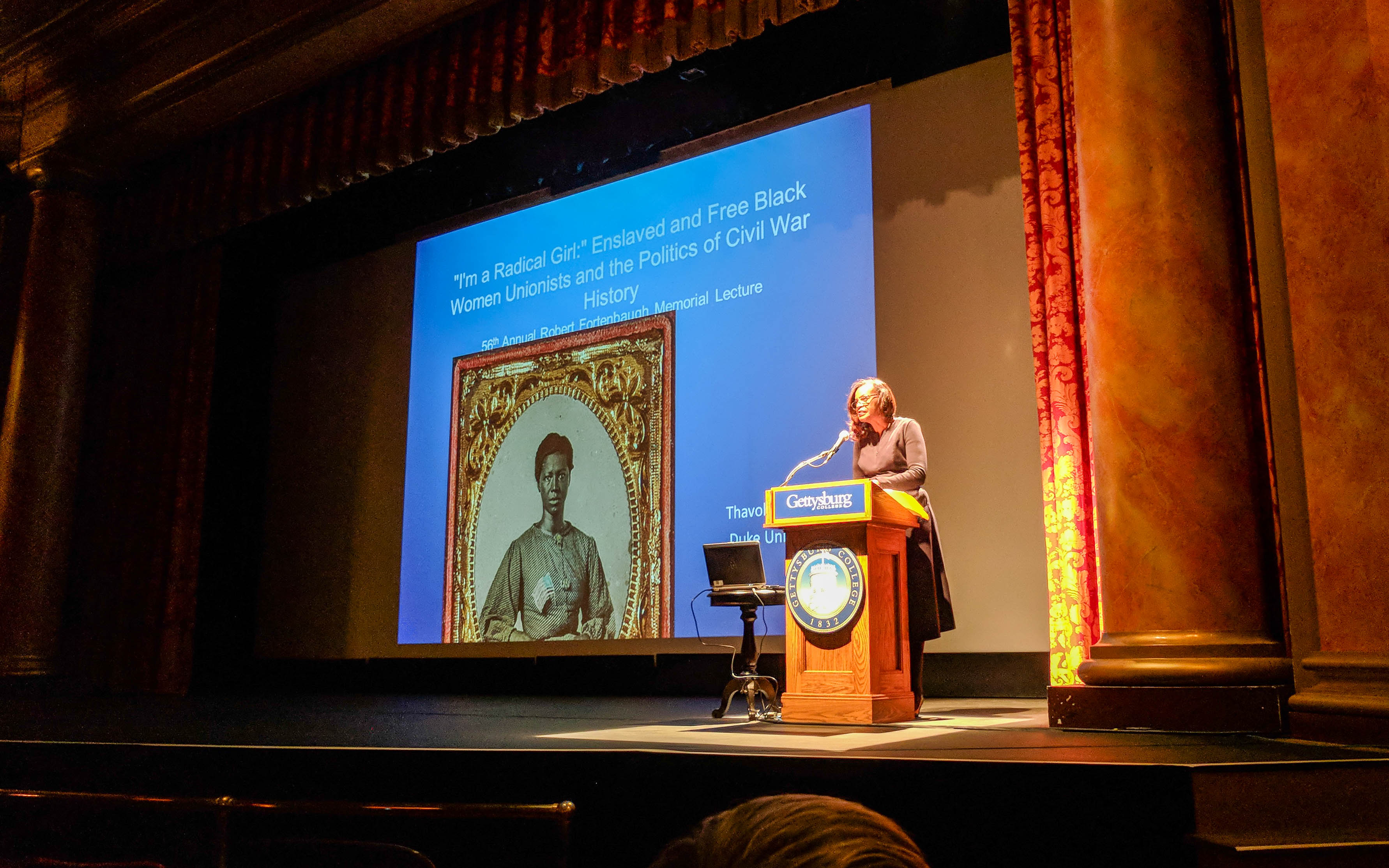‘I’m a Radical Girl’: Thavolia Glymph Delivers 56th Annual Fortenbaugh Lecture

Dr. Thavolia Glymph delivered the 56th Annual Fortenbaugh Lecture on Sunday, November 19 (Photo Mary Frasier / The Gettysburgian)
By Mary Frasier, Contributing Writer
The 56th Annual Robert Fortenbaugh Memorial Lecture took place at the Majestic Theater on Sunday. The event is held in memory of Professor Robert Fortenbaugh, who taught history at Gettysburg College for over 30 years. It is held each year on the 19th of November to honor the anniversary of the delivery of the Gettysburg Address. Gettysburg College’s Civil War Institute sponsored the talk, running the invitation only dinner prior to the lecture, as well as the lecture later that evening. The event was free of charge and open to the general public, which ostensibly encouraged over 260 people to attend.
This year’s lecture, “‘I’m a Radical Girl.’ Enslaved and Free Black Women Unionists and the Politics of Civil War History,” was given by Dr. Thavolia Glymph, Professor of History at Duke University. Glymph specializes in women’s history, slavery, emancipation, the Civil War, and Reconstruction. She published a book in 2008 called Out of the House of Bondage: The Transformation of the Plantation Household and is currently working on two other book projects at the moment. She will serve as the 86th president of the Southern Historical Association in 2020.
During the lecture, Glymph specifically spoke about the subject matters of her 2008 book, predominantly discussing how African American women living during and after the time of the Civil War were major supporters of the Union and its efforts during the war. Unfortunately, these women were never recognized as unionists by the government or any civilians because of the color of their skin. White women were the only women who were considered unionists. Instead of being praised for their constant support of the Union Army and its efforts, African American women were placed in refugee camps where they had to work for their rations and pay for the rations of the elderly who could not work. African American women of that period were not thought to have political thoughts “at the kitchen table” let alone public spaces. However, Glymph told the audience that, from the very beginning of the war, African American women had the same ideals as the union army.
“We have been tricked by images of slaves during the Civil War that tell a story, but only part of a story,” intoned Glymph, “They look passive.”
When looking at photos taken of slaves during the Civil War, they tend to look uninterested and uneducated, which is why many people assumed they did not understand the political environment of the time nor did they want to. However, the slaves understood what was taking place and knew that supporting the union was the only way to escape their horrid living conditions, Glymph said.
“Slavery had allowed them [slaves] but cramped room to breathe,” she explained.
Slaves did not burn their masters’ properties in rage like people believed, but with the knowledge that ruining their crops would greatly harm them politically and economically.
White people believed that African Americans did not have emotional or affectionate attachments to their family members. Glymph told the story of a young woman being sold at a slave auction, with her baby daughter in her arms. When a man bought her and not her daughter she pleaded with him to also purchase her child. He replied that there was a puppy on the plantation she could play with instead. Her daughter grew up and told her son that story, who continued to pass it on through the ages. Glymph repeatedly emphasized that the descendants of slaves and their heart-wrenching stories demonstrate the terrible conditions of the slaves and explains why they were adamant supporters of the Union.
Glymph’s lecture was met with a thunderous applause from the audience. Following her speech, Glymph had a short book signing, with Gettysburg College’s Bookstore selling copies of her 2008 book in the lobby.
